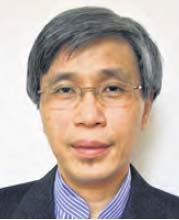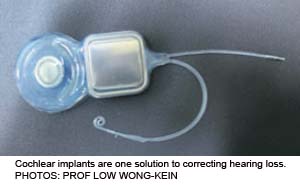 |

Can you hear me?
Prolonged exposure to loud music from your MP3 player can lead to irreversible loss of hearing, reports Philip Lee
Source: The Straits Times - Health & You, Thursday, 1st July 2010
By: Philip Lee
 PROFESSOR Low Wong-Kein (below) was travelling on an MRT train recently when he heard music being played. PROFESSOR Low Wong-Kein (below) was travelling on an MRT train recently when he heard music being played.
He realised it was coming from the opposite bench where a teenager was using earphones to listen to an MP3 player.
 |
Recalls Prof Low: “To be able to hear the music from where I was sitting means that the boy was playing it too loudly.
“If he continues to do this often and over prolonged periods, he can develop early hearing loss.”
Prof Low, who is director of the Centre for Hearing and Ear Implants at the Singapore General Hospital, says this is one worrying trend he has observed among teenagers today.
“Years ago, people experienced significant hearing loss at the age of 70 or 80.
“In about 20 or 30 years’ time, we will see people developing hearing loss at a younger age due mainly to loud noise in leisure activities such as night clubs outings or repeated and prolonged use of MP3 players or iPods,” he says.
Another specialist, Dr Chan Kwai Onn, a consultant surgeon at the K O Chan Ear Nose and Throat Sinus and Sleep Centre in Novena Medical Center, adds a chilling warning: “Be very careful of noise-induced hearing loss. It is insidious, painless and irreversible.”
This means that people who are at risk do not realise it, as the condition can quietly get worse until profound hearing loss becomes obvious, by which time it is too late.
 Prof Low says hearing loss is irreversible and it can only be corrected by hearing aids or cochlear implants, also known as the bionic ear. Prof Low says hearing loss is irreversible and it can only be corrected by hearing aids or cochlear implants, also known as the bionic ear.
The cochlea is the auditory part of the inner ear.
“We are born with a fixed number of auditory hair cells, 15,000 in each ear. These cells in humans don’t regenerate. If they are damaged, they don’t recover.
“Loud noise triggers the production of chemical oxidants and these can damage hair cells, which also die naturally as one gets older.”
Cochlear implants stimulate the auditory nerves directly without the need for hair cells to do this, adds Prof Low.
On congenital hearing loss, he says that parents usually realise there is a problem when their children are about two or two and a half years old.
“This is considered very late. It has been shown that hearing loss in children should be detected when they are three months old, and intervention should take place no later than six months old for optimal treatment results.”
Childhood hearing loss can be due to genetic or non-genetic factors.
A genetic cause is when a child is born with insufficient number of hair cells.
Non-genetic causes are when a pregnant woman contracts rubella (German measles) or takes certain medicines. A brain infection such as meningitis can also result in hearing loss.
A less well-known cause of hearing loss that can occur at any age is sudden sensorineural hearing loss, explains Dr Chan.
“The cause is thought to be viral infection, reduction of blood supply to the ear or, rarely, a brain tumour.”
Dr Chan relates the case of a 15-year-old student who suffered an 80 per cent hearing loss in her left ear.
“She was given steroids, antiviral medication and medications to improve blood circulation to the ears. She made a complete recovery.”
For people with defective cochleas, a cochlear implant can improve the quality of their lives.
In the late 1990s, Prof Low saw an eight-year-old girl born with defective cochleas in both ears and performed a bionic ear implant. Today, at age 20, she is pursuing a double degree course in the biomedical sciences andtraditional Chinese medicine.
Prof Low says the detection of early childhood hearing loss has been made possible by a simple ear test that is done soon after babies are born.
Known as the Universal Newborn Hearing Screening, it can detect in five minutes if a baby has hearing problems.
“This test, which is very affordable, is offered to all parents before the baby and mother are discharged from hospital.
“In a study some years ago, we found that more than 90 per cent of parents opted for this test,” says Prof Low.
|